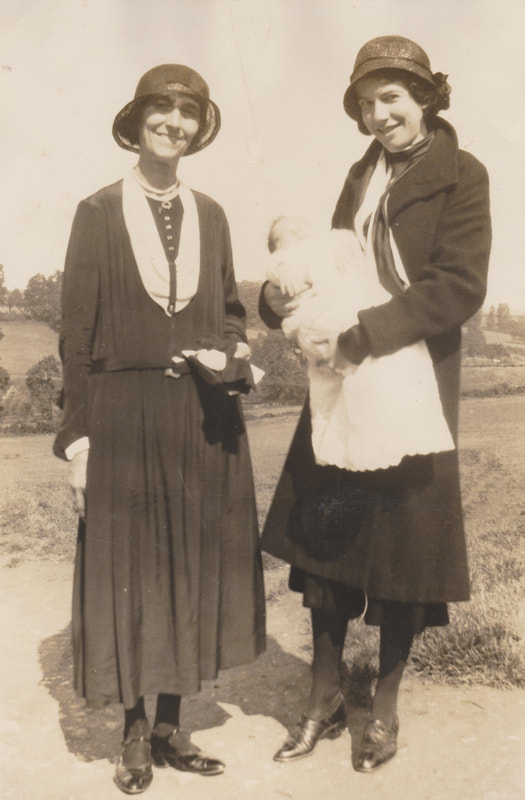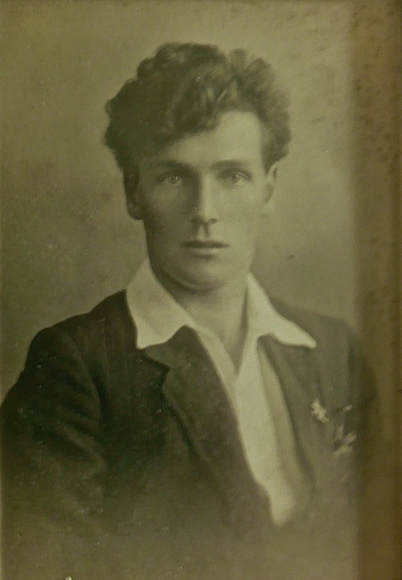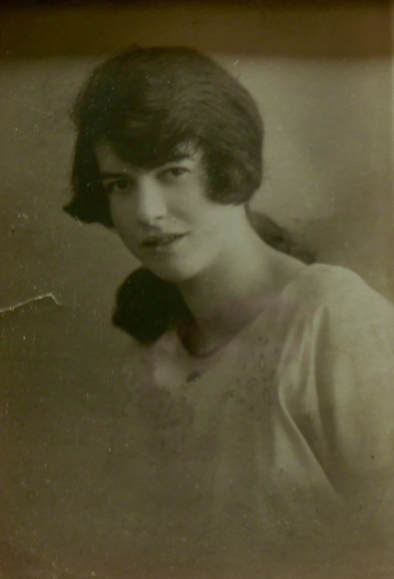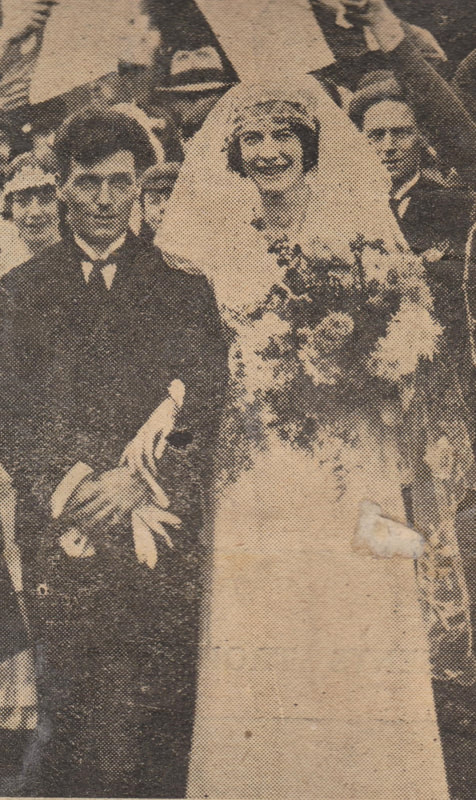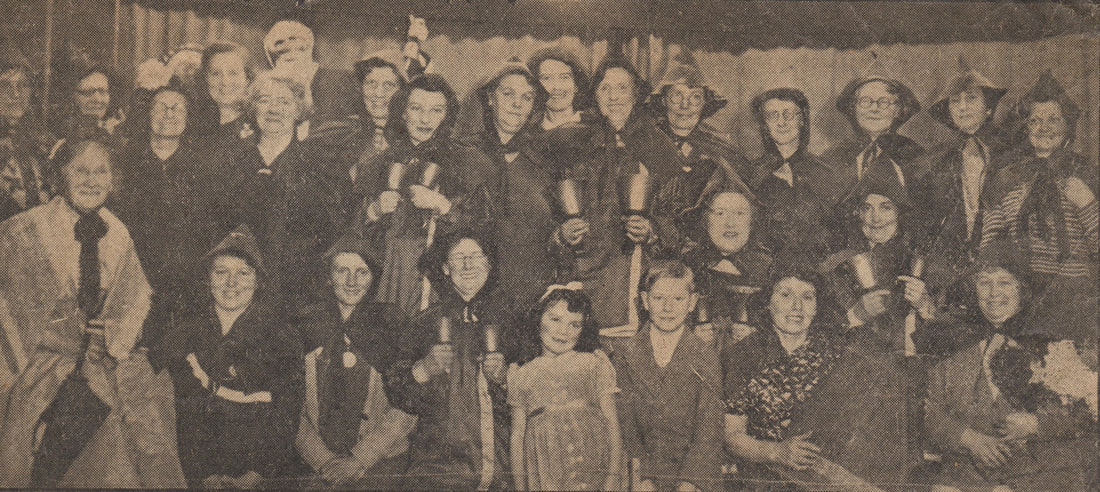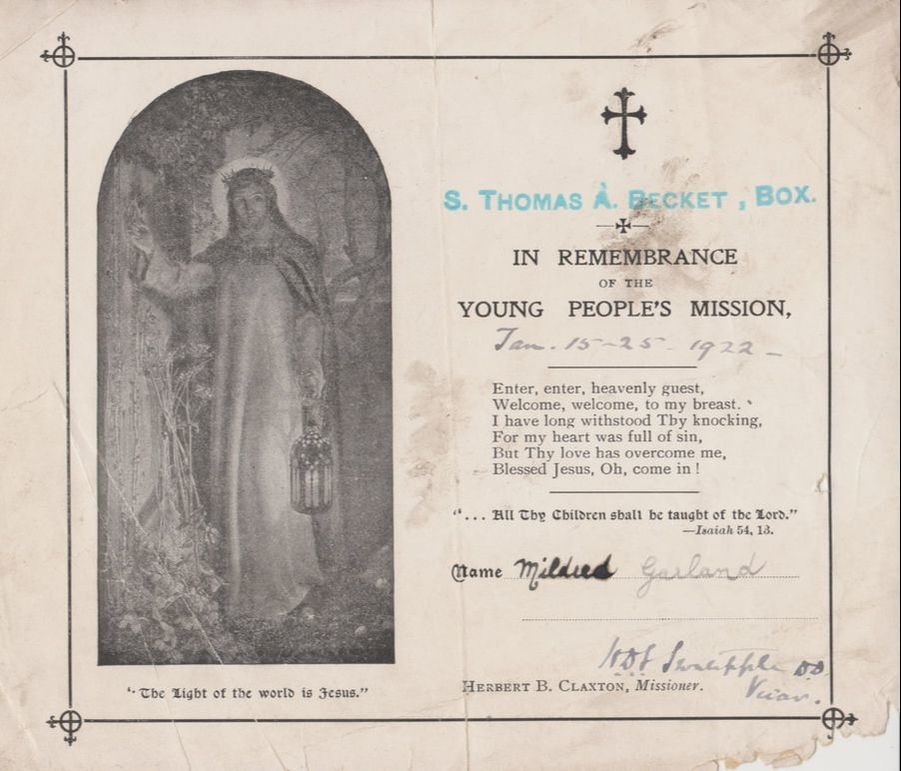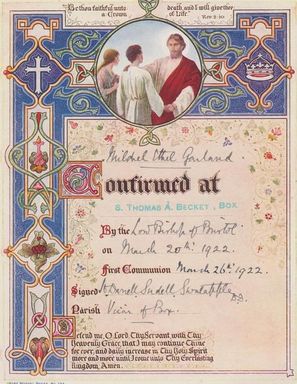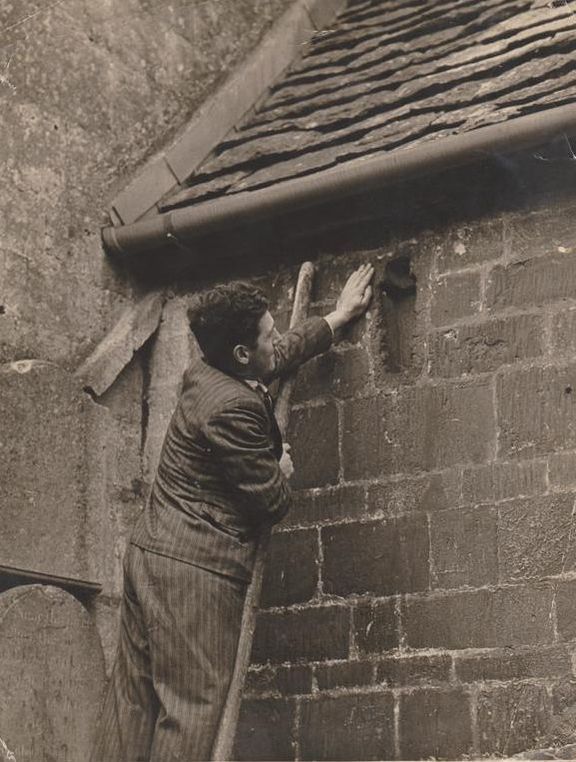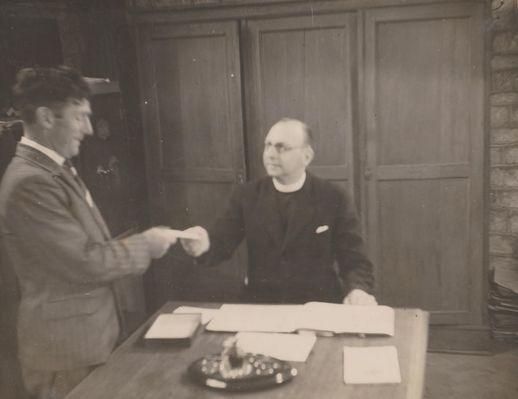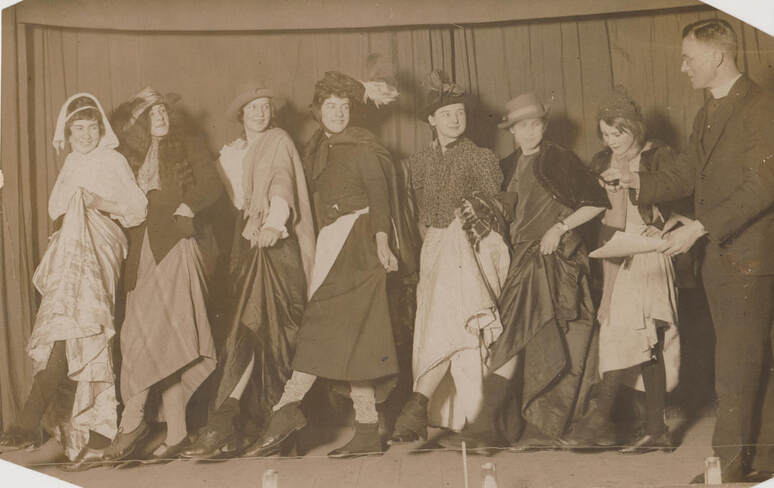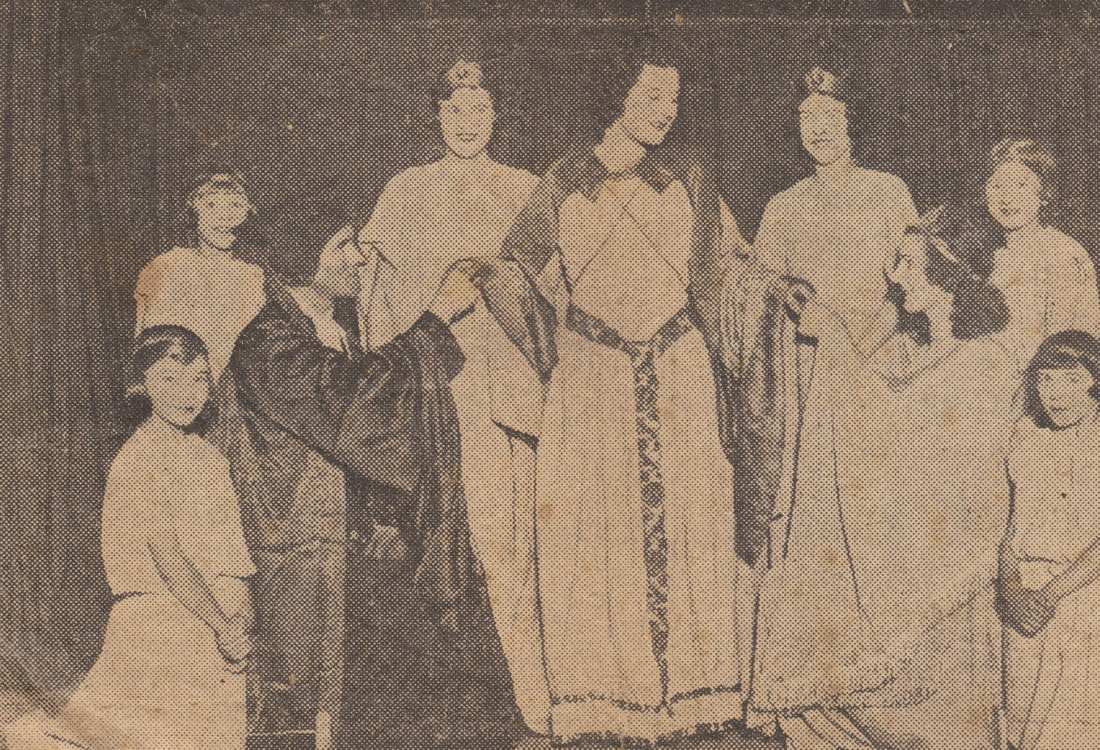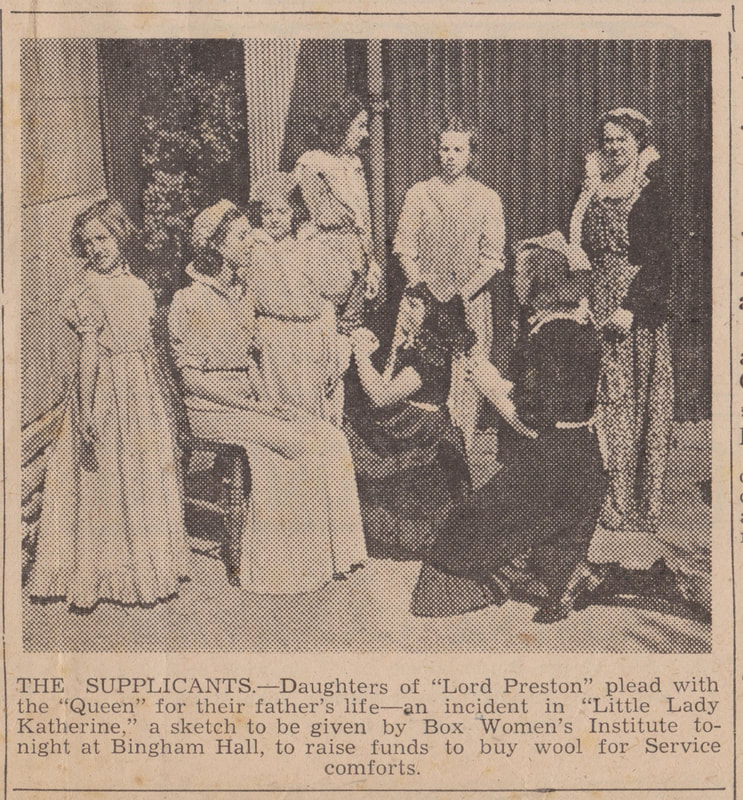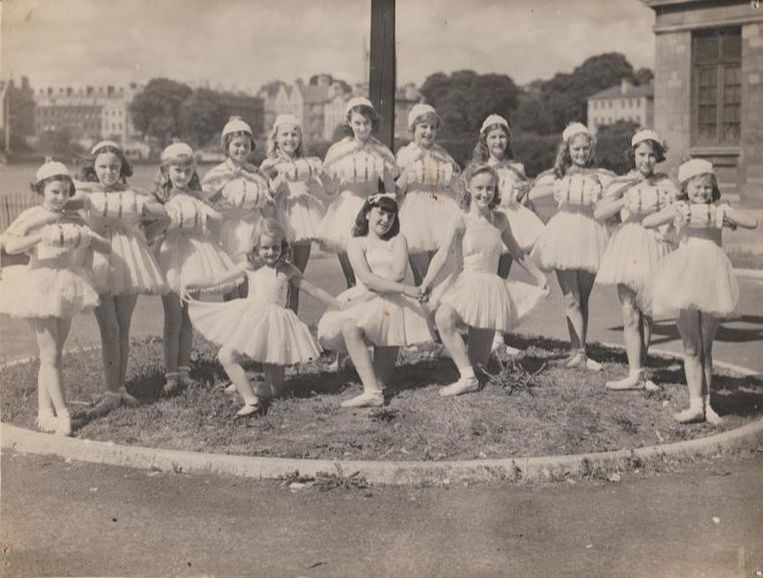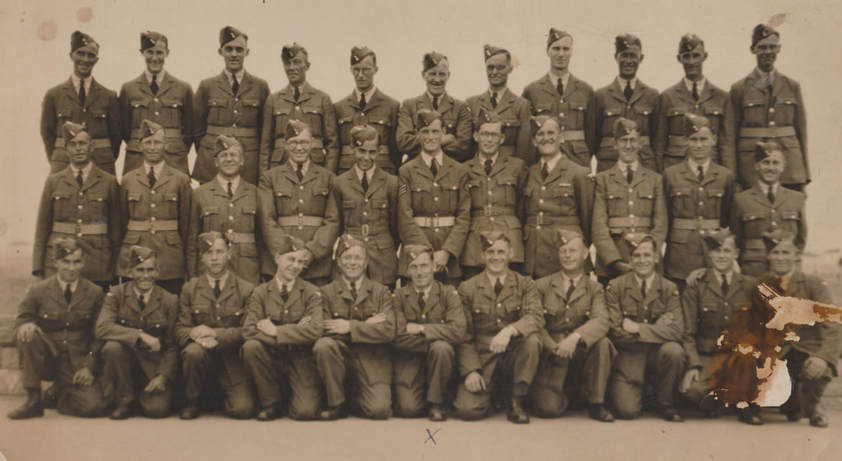|
Mildred and Stanley Brunt Genevieve Horne (nee Brunt) Unless stated All Newspaper photos courtesy The Wiltshire Times August 2018 My mother Mildred Brunt (nee Garland) was a dynamic character, a born leader and organiser of others. She devoted herself to her own children and other young people in the village. They dared to bring new ideas into Box by putting their heads above a parapet of conformity and a wall of silence. Mildred's publicity for her shows was truly remarkable in its volume and vision. In so doing she created feelings of jealousy and envy amongst some residents. The family changed their allegiance from Box Church to the Methodist Chapel after the war and they caused some raised eyebrows when they left Box in 1952 to move into Bath. It was Box's loss after so many generations had lived in the village, a very sad occasion for all. Right: Three generations of the Garland family: Grandmother Kate, Mildred and baby Edwina in 1932 |
My Parents
My parents had been a couple since 1920 when Mildred was 15 and Stanley 16 but waited to marry until November 1930 when they had some savings.[1] They had to do some acting on their wedding day to avoid showing their lack of money. They waved the guests goodbye when they boarded the train at Mill Lane Halt for their honeymoon in Worcester but got off at Box Station to continue their journey on my dad's motor bike and sidecar, which was a lot cheaper.
My parents had been a couple since 1920 when Mildred was 15 and Stanley 16 but waited to marry until November 1930 when they had some savings.[1] They had to do some acting on their wedding day to avoid showing their lack of money. They waved the guests goodbye when they boarded the train at Mill Lane Halt for their honeymoon in Worcester but got off at Box Station to continue their journey on my dad's motor bike and sidecar, which was a lot cheaper.
The young Stanley and Mildred before their marriage
|
Marriage
The wedding of Stanley Brunt and Mildred Garland was a notable event in November 1930.[2] My mother started a scrapbook of family memorabilia called The Chronicle of the Brunts of Valens Terrace to which much of this story is indebted. The 1st Box Company of Rangers (Senior Girl Guides) formed an Archway of Morse flags, respecting their long-time patrol leader, Mildred. The bride was adorned with pale pink rosebuds, a wreath of orange blossom and a bouquet of chrysanthemums, all presumably organised by her father, head gardener for the Shaw-Mellors at Box House. The Hon Mrs Dora Shaw-Mellor played the organ and their long-standing family friend George Hinton of Henley rang the church bells. Stanley was struggling to find a stable career and was living with his parents at Ben Mead, Middlehill. At the time he was a salesman but had proved his reliability by saving hard for ten years to marry his childhood sweetheart. The couple had prospects and took a flat above a shop in The Parade, Market Place, Box. Women's Institute Several clubs and associations specifically for women existed in the 1930s, the most significant in Box being the Mothers' Union at Box Church and the Women's Institute. Right: Wedding with processional arch of Guides' flags |
The WI started annual Christmas gatherings for elderly residents in 1931 under the leadership of Doris Chappell of Hatt House and Mrs Shaw Mellor of Box House.[3] They ferried the Old Folks to and from the Bingham Hall, arranged entertainment and paid for small gifts and catering. Madams Woodland, AK Lambert, Goulstone, Toy and Eyles were prominent helpers and the ladies of the churches, Madams, Maltin, Thomas, Perren and Sister Lilian Lamb also contributed. Mildred soon became involved in writing sketches and small dramas to entertain the audience.
Box Church Supporters
Both Stanley and Mildred had a long connection with St Thomas à Becket church. Mildred had been a regular attendee at the church following the influence of her parents. In 1922 she completed a 10-day course in the Church Young People's Mission under the direction of the Rev Sweetapple of Box, in preparation for her confirmation.
Both Stanley and Mildred had a long connection with St Thomas à Becket church. Mildred had been a regular attendee at the church following the influence of her parents. In 1922 she completed a 10-day course in the Church Young People's Mission under the direction of the Rev Sweetapple of Box, in preparation for her confirmation.
Stanley served as a verger at Box Church for nine years and had only been absent from church two or three times during that whole period. He often did maintenance work on the building.
The Church Army Play
My parents didn't have much of a honeymoon because later that month they both appeared in Rev and Mrs George Foster's epic pageant about The Church Army performed by the Box Church Players' Guild in the Bingham Hall in 1930.[4] The performance received massive publicity and it changed the lives of many participants including my parents. Ex-servicemen played roles in scenes depicting the Church Army at the Front and the piece had eight separate scenes from the vision of St Francis that inspired it, the Church Army's work in London slums, through to its work with motherless children and caravanning prison-gate missions. Most of the notables in the village were represented with 62 named parts plus extras. The man who founded the Church Army in 1882, Prebendary Wilson Carlile of St Paul's Cathedral, attended the first of six nights at the age of 84.
My parents didn't have much of a honeymoon because later that month they both appeared in Rev and Mrs George Foster's epic pageant about The Church Army performed by the Box Church Players' Guild in the Bingham Hall in 1930.[4] The performance received massive publicity and it changed the lives of many participants including my parents. Ex-servicemen played roles in scenes depicting the Church Army at the Front and the piece had eight separate scenes from the vision of St Francis that inspired it, the Church Army's work in London slums, through to its work with motherless children and caravanning prison-gate missions. Most of the notables in the village were represented with 62 named parts plus extras. The man who founded the Church Army in 1882, Prebendary Wilson Carlile of St Paul's Cathedral, attended the first of six nights at the age of 84.
|
Other productions by the Rev Foster followed, included the Passion and Nativity plays. Mildred appeared in many of them and obviously caught the bug for acting and performing.
The early 1930s were comparatively peaceful years when dressing up and entering a world of imagination was common as a way of ignoring the reality of recession.The Way of Compassion was the 1931 play by the Box Church Players' Guild, where Mildred again performed and Box Fete was a regular for showing off one's finery.[5] By 1933 Germany began rearming and these years of frivolity were rapidly anachronistic. After having a policy of non-intervention in the Spanish Civil War, Britain followed the rearmament route in 1936 as the best method of preserving peace.[6] |
Mildred Brunt, Theatre Producer
In November 1936 my mother appeared in an unconventional social event where she was elected the Most Womanly Woman in the show for her ability to powder and fully dress a baby doll.[7] The Most He-Man contest involved sawing and hammering a six-inch nail, which was easily won by Austin Wootten. Mildred occasionally appeared in Women's Institute shows, such as Mechanical Jane, a play about buying a robot which turned out to be a terrifying servant. In February 1938 she performed in a play Her First Kiss along with Mrs Hillier, Sheppard and King in aid of Methodist Hall Funds. Edwina appeared as a passenger in a tiny cart in a party version of Horsey, Horsey.
Mildred continued performing but her family, dance arrangements and theatre productions took most of her time. My parents worked hard to stage my sister's performances with costumes, settings and choreography. As the threat of war grew closer, the need for entertainment as an antidote became more vital. They organised shows for my sister Edwina locally supporting charity fund-raising events, and regionally in Bath and Bristol at Eisteddfods and pageants.
Coronation Day, 1937
The weather was fine for Box's celebration of the coronation on 12 May 1937. George Hinton (father of Leslie Hinton) chimed the church bells early and the Rev Arthur Maltin held an 8am communion service and a 10am united service with the Rev A Plant of Ditteridge and Rev RT Richards of Box Methodists. They were joined by members of the Box Company of Girl Guides under Captain G Toy and Lieutenant G Chaffey together with Box Troop of Boy Scouts under Scoutmaster Phil Lambert after an opening ceremony at the flagstaff in the Recreation Field.
An assembly of decorated vehicles was held on the Rec featuring J and G Browning's Britannia Car with The Band under bandmaster A Weeks, Les Bence's Sports Car and a procession of Kings and Queens with their retinues. In the afternoon there was a comic football match, presentation of Coronation mugs to children under 16, an acrobatic display, a staged motor accident re-enacted by St John Ambulance and the crowd stood silently to listen to the radio broadcast of the King's Speech.
In November 1936 my mother appeared in an unconventional social event where she was elected the Most Womanly Woman in the show for her ability to powder and fully dress a baby doll.[7] The Most He-Man contest involved sawing and hammering a six-inch nail, which was easily won by Austin Wootten. Mildred occasionally appeared in Women's Institute shows, such as Mechanical Jane, a play about buying a robot which turned out to be a terrifying servant. In February 1938 she performed in a play Her First Kiss along with Mrs Hillier, Sheppard and King in aid of Methodist Hall Funds. Edwina appeared as a passenger in a tiny cart in a party version of Horsey, Horsey.
Mildred continued performing but her family, dance arrangements and theatre productions took most of her time. My parents worked hard to stage my sister's performances with costumes, settings and choreography. As the threat of war grew closer, the need for entertainment as an antidote became more vital. They organised shows for my sister Edwina locally supporting charity fund-raising events, and regionally in Bath and Bristol at Eisteddfods and pageants.
Coronation Day, 1937
The weather was fine for Box's celebration of the coronation on 12 May 1937. George Hinton (father of Leslie Hinton) chimed the church bells early and the Rev Arthur Maltin held an 8am communion service and a 10am united service with the Rev A Plant of Ditteridge and Rev RT Richards of Box Methodists. They were joined by members of the Box Company of Girl Guides under Captain G Toy and Lieutenant G Chaffey together with Box Troop of Boy Scouts under Scoutmaster Phil Lambert after an opening ceremony at the flagstaff in the Recreation Field.
An assembly of decorated vehicles was held on the Rec featuring J and G Browning's Britannia Car with The Band under bandmaster A Weeks, Les Bence's Sports Car and a procession of Kings and Queens with their retinues. In the afternoon there was a comic football match, presentation of Coronation mugs to children under 16, an acrobatic display, a staged motor accident re-enacted by St John Ambulance and the crowd stood silently to listen to the radio broadcast of the King's Speech.
|
The evening entertainment included a Chinese lantern and fireworks display on the Rec, dancing in the Bingham Hall and a skittles competition with the prize of a pig for winner, Mr MacCurrant of Ashley. My sister, four year old Edwina, was part of a Coster Pearly King and Queen display with Master Billy Hall.
Outbreak of War When war started Mildred was active in the Lita-Jane School of Dancing, Bath and the Women's Institute work to support servicemen and women on the Front. In July 1942 the WI raised money for the war effort including the support of war-bombed babies and to provide woollen clothing for servicemen. As public morale was increasingly drained by the war, more events were held in the village. In July 1943 Mildred started organising events for the Women's Institute including a variety concert in the Bingham Hall in August 1943 to fundraise for the Royal United Hospital, Bath.[8] |
My father, Stanley Brunt, was called up for the Royal Air Force during the Second World War. He was serving at RAF North Cotes, Lincolnshire, when his hut (which he shared with 24 others) was hit by a German shell. After being buried for three days, he was one of the few men to survive but he was severely shell-shocked and never flew on active service. It was probably in August 1942 because my parents kept a telegram from Stanley saying that he was returning home suddenly that Sunday and he was discharged on medical grounds in September.[9] For years afterwards the sound of thunder would terrify him and he would insist that we all sheltered in the cupboard whilst he patrolled outside. It was sad to see him.
The reason that the family changed their allegiance from Box Church to the Methodist Chapel was due in part to my father's disappointment at losing the Verger's duties which he had done for nine years prior to being called up in 1939 into the Royal Air Force. He had, on many occasions, been a very faithful servant to Box Church by doing maintenance and handyman-work when required. He felt that such dedication to the Church warranted his reinstatement to his pre-defending-the-country position. This influenced his decision to patronise the Methodist Chapel instead.
My Mother, had sent my sister Edwina to private school, and in so doing had apparently stepped above her station in the eyes of some. Mrs Shaw-Mellor had had a word in private with my mother to inform her that sending her 9 year old daughter to be privately educated in Bath was inappropriate for someone of her working class status. She made her views known to the Mothers' Union to which many of the local women belonged including my mother. It would be fair to say that my mother was not over-the-moon about Mrs Shaw-Mellor's opinions but, in those days, one had to be careful about expressing opinions when all the gentry controlled employment, and tied housing.
It is true to say that the family's move from Box to Bath raised some eyebrows. The reason they left was because my father, Stanley, was transferred to Bath as a consequence of the local telephone exchange being automated. Also Edwina's husband Toni needed permanent employment in his field of cabinet-making and French-polishing, trades in which he was highly skilled My brother Tim was soon to leave school and also had to find suitable employment, none of which was available in Box at that time. So the move to Bath became something of a necessity for their future.
My Mother, had sent my sister Edwina to private school, and in so doing had apparently stepped above her station in the eyes of some. Mrs Shaw-Mellor had had a word in private with my mother to inform her that sending her 9 year old daughter to be privately educated in Bath was inappropriate for someone of her working class status. She made her views known to the Mothers' Union to which many of the local women belonged including my mother. It would be fair to say that my mother was not over-the-moon about Mrs Shaw-Mellor's opinions but, in those days, one had to be careful about expressing opinions when all the gentry controlled employment, and tied housing.
It is true to say that the family's move from Box to Bath raised some eyebrows. The reason they left was because my father, Stanley, was transferred to Bath as a consequence of the local telephone exchange being automated. Also Edwina's husband Toni needed permanent employment in his field of cabinet-making and French-polishing, trades in which he was highly skilled My brother Tim was soon to leave school and also had to find suitable employment, none of which was available in Box at that time. So the move to Bath became something of a necessity for their future.
Mildred Brunt's achievement had been enormous in giving culture and vision to the children of Box (especially the girls) outside of the drab lifetime of the 1930 recessions and war time. She was a solo whirlwind and took people with her by strength of character. Her manipulation of the press to promote her works was exceptional, as the family scrapbooks show. Box children of that time owe an enormous debt of gratitude to her commitment.
Mildred and Stanley and their children had all their roots in Box and they would have been significant residents in that respect. But they gave so much more back than they took from living here. They inspired and organised a great secular revival of the village in the 1930s and 40s, bringing dance shows, pantomimes and plays to the everyday life of residents throughout the war years. Always their shows were for local charitable causes. Throughout they gave local children a cultural basis as part of their development.
Mildred and Stanley and their children had all their roots in Box and they would have been significant residents in that respect. But they gave so much more back than they took from living here. They inspired and organised a great secular revival of the village in the 1930s and 40s, bringing dance shows, pantomimes and plays to the everyday life of residents throughout the war years. Always their shows were for local charitable causes. Throughout they gave local children a cultural basis as part of their development.
References
[1] Unless otherwise stated, references are from the family scrapbook
[2] Unless otherwise stated, references are from the family scrapbook
[3] Bath Weekly Chronicle and Herald, 4 January 1936
[4] The Wiltshire Times, 22 November 1930
[5] Bath Weekly Chronicle and Herald, 29 July 1933
[6] Bath and Wilts Chronicle and Herald, 20 November 1936
[7] Bath and Wilts Chronicle and Herald, 20 November 1936
[8] Bath Weekly Chronicle and Herald, 28 August 1943
[9] Wiltshire Times and Trowbridge Advertiser, 19 September 1942
[1] Unless otherwise stated, references are from the family scrapbook
[2] Unless otherwise stated, references are from the family scrapbook
[3] Bath Weekly Chronicle and Herald, 4 January 1936
[4] The Wiltshire Times, 22 November 1930
[5] Bath Weekly Chronicle and Herald, 29 July 1933
[6] Bath and Wilts Chronicle and Herald, 20 November 1936
[7] Bath and Wilts Chronicle and Herald, 20 November 1936
[8] Bath Weekly Chronicle and Herald, 28 August 1943
[9] Wiltshire Times and Trowbridge Advertiser, 19 September 1942
